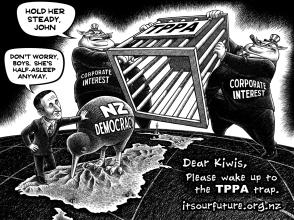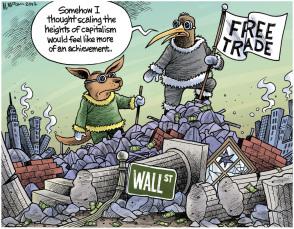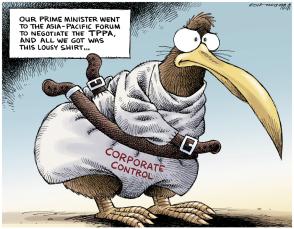And a call to build resistance against the TPP

Kiwis in New Zealand have been at the forefront of anti-TPP organizing, thus far.
Members and partners of Trans Pacific Partnership (known as TPP or TPPA) held the 16th-round of talks in Singapore last week. As usual, the talks were shrouded in secrecy. Hundreds of trade delegates and policy makers from 11 countries, including the US, met to negotiate expanding profit-driven industrial commerce, including special agendas to smooth trade flows between member countries in the grouping.

Farmers stage a protest march during an anti-TPP rally in Tokyo, April 25, 2012. Similar rallies were held last week.
While we heard reports of farmers in Japan protesting, solidarity rallies of labor and environmental activists and a bunch of petitions sent to congresspeople, responses to the TPP negotiations thus far have been far too calm and comfortable. But it doesn’t have to stay that way…
The following article (which will be printed in the coming Earth First! Journal) is a call for renewed resistance to the expansion of corporate globalization:
Resisting the Trans-Pacific Partnership
by Dominique Aulisio

EF! News note: While it can be nice to imagine the ruins of this industrial society, lets aim to make it on our own terms.
The massive trade deal that the Obama administration is currently negotiating, the Trans-Pacific Partnership (TPP), is perhaps one of their best kept secrets. The text itself is being negotiated in complete secrecy—not even Congress has access, though several hundred corporate advisors do. However, we do know about several provisions designed to wildly expand privileges for corporations because two of the TPP’s 29 chapters have been leaked to the public. The TPP touches everything from GMO labeling and environmental regulations to internet accessibility, availability of life-saving generic drugs, and more. Current participants include the US, Canada, Mexico, Australia, New Zealand, Chile, Peru, Malaysia, Vietnam, Singapore, and Brunei. Since the US already has free trade agreements with 6 of these countries, it is clear that the TPP is about expanding corporate control, rather than expanding trade.
The scope of the TPP is reminiscent of that of the 2003 Free Trade Area of the Americas (FTAA) proposal and the 1999 World Trade Organization deal. According to Public Citizen’s Global Trade Watch, the US hopes the TPP will be the last trade agreement they ever have to negotiate. By the time negotiations are through, many more than the 11 countries currently involved may sign onto the deal, and it will be left open for any country to sign on in the future as long as they agree to submit to all of its principles. There is a small but quickly growing grassroots movement in the US exposing the TPP with teach-ins, webinars, independent media coverage, and loud theatrical actions at rounds of negotiations over the past year in Leesburg, VA, San Diego, and Dallas.

Rally in Leesburg, VA 2012
One of the most troubling aspects of the TPP is the “Investor-State” dispute resolution system, in which multinational corporations will be able to sue sovereign nations in a private tribunal if they deem the government is interfering with their profits. The three judges will rotate between hearing cases and serving as attorneys for corporations. Under the similar tribunal created by NAFTA, the governments of Canada and Mexico have been forced to shell out $365 million to corporations for attempting to enforce their own legislation to protect human rights and the environment.
In one example of many, the US company, Metalclad, sued the Mexican government in ’97 for $15.6 million when Mexico denied them a permit to build a toxic waste plant, based on their refusal to clean up toxic waste problems from an existing facility. The NAFTA tribunal ruled in Metalclad’s favor, and the taxpayers of Mexico paid up. A similar case is pending right now under the US-Peru free trade agreement (FTA) around the Renco smelter in La Oroya, which is deemed one of the ten most contaminated sites in the world. The Renco plant spews waste containing lead and arsenic, linked to multiples deaths and severe impacts to residents and the surrounding environment. There are currently $13 billion in similar pending cases under NAFTA and the US-Peru FTA.
The Investor-State tribunal trumps all domestic law and will undoubtedly have a “chilling effect” on the enforcement and enactment of new regulatory law. The TPP is one more tool for the destruction of ecosystems by multinationals, leaving oil and chemical spills, clear cutting, mining, and ever-increasing carbon emissions in their wake.

Actress Q’orianka Kilcher, arrested outside TPP meeting at Lansdowne Resort in Leesburg, VA, Sept. 13, 2012, as she filmed fellow activists, according to a statement issued by Rainforest Action Network, Kilcher arrived to assist in delivering petitions protesting the trade agreement.
Not only will multinationals deepen “global corporate governance” with their puppet tribunal, they will win far-flung new privileges written into the TPP. The Sierra Club has highlighted that the TPP will remove the oversight process for exportation of liquefied natural gas (LNG), which they expect will lead to an increase in fracking operations in the US. Elements of the Stop Online Piracy Act (SOPA), which was killed in Congress last year, have also been revived in the TPP, including provisions to require policing of internet users, crack down on illegal downloads, and a ban of open source software like Linux. Big Pharma has included provisions to extend the life span of name-brand patents, delaying the release of generics and renegotiating pricing on government drug formularies, like Medicare and Medicaid. There are provisions to incentivize further offshoring of jobs from the US, to ban “Buy American” and “Buy Local” procurement policies, and to deregulate food safety standards. The TPP will also further deregulate the financial services sector and could create bans on GMO labeling for participating countries.
Last fall, Obama announced that he hopes to complete TPP negotiations by October of 2013. Obama is requesting that Congress grant him use of the “Fast Track” provision to slide the bill through Congress once finalized. Fast Track, or Presidential Trade Authority, is an executive privilege created under the Nixon administration to remove Congress from the trade negotiation process by having them “rubber stamp” trade bills. Congress members will be required to hold an up-or-down vote on the bill within a time span of 90 days or less, with no opportunity to view the text of the TPP. All free trade agreements that have been introduced in Congress in the past decade have been passed, and Fast Track was used for the majority of them. On the legislative front, activists are focusing on recruiting Congressional Representatives to demand a release of the TPP text and to deny Obama permission to use Fast Track for this bill when he requests it. Because the TPP text is being kept secret unlike previous FTAs, and in light of the current political climate, stopping the TPP by killing Fast Track is a real possibility.

Comic from New Zealand group’s satire cartoon competition
On an international front, there is a push in the US to demonstrate solidarity with the people of other countries involved in the agreement and to influence negotiators to back away from an agreement that will be detrimental to many sectors of their economy as well as their ecosystems. In several TPP countries, there is already organized resistance to the agreement. In New Zealand, where the most recent round of negotiations took place in December 2012, organizations have planned a series of educational events and protests. (Find out more about: ItsOurFuture.org.nz)
In Malaysia, HIV/AIDS activists have organized strong resistance to the TPP surrounding access to life-saving medications, many of which will be completely inaccessible in their country if the TPP is implemented. In Japan, opposition to the TPP among civil society and their agricultural sector is strong, and they have made it clear that any candidate for Prime Minister who looks to join the TPP will not be elected. Meanwhile, Australia is resisting the Investor-State tribunal provision that will enable multinationals to sue countries, and has not submitted to this portion of the agreement. Despite signs that Investor-State provisions could backfire on the US (as it did in the WTO case on “country of origin” labeling of beef that will go into effect this year), the Obama administration is the negotiating force that is pushing the most lurid, greed-driven provisions of the TPP.
Speaking out about the TPP is a chance to rekindle a fierce anti-globalization, anti-imperialist movement. It is work that we must do if we are going to stop the TPP, and the alternative is grim. FTAs are one of the most important tools that corporations use to gain access to resources, to steal land and extract minerals, to push farmers off of their land, to replace ecosystems with monocrops and chemicals. FTAs allow multinationals to override the regulations of sovereign nations and to change the face of their cultures and especially their countrysides. They are designed to push down wages and create a global “race to the bottom” in terms of labor standards. And these agreements go hand in hand with militarization as the US and allies attempt to maintain control of their investments in other countries.
In part due to the lack of information, response from activists to the TPP has been very subdued compared to the mass protests that we saw during the Seattle WTO in ’99 and Miami FTAA in ’03. However, in the past decade, the US has ratified a slew of FTAs with little political consequences for those involved. What happened to the energy that took the country by storm at the Battle in Seattle? Trade agreements brokered by the US are no less outrageous and one sided today than they were ten and fifteen years ago.
Labor and human rights organizations did put forth a formidable effort to stop the passage of the US-Colombia FTA, which was passed last year. Their opposition was based not only on the threat that free trade itself poses to the urban and rural economies in Colombia and to US jobs, but on grounds of the frequent murders of union leaders in Colombia as a major human rights concern. However, there was a marked absence of mass mobilizations in the US voicing solidarity with the people of Colombia and concern for the environment. The week that the trade agreement went into effect in July of 2012, people took to the streets organizing demonstrations and riots, facing a repressive police force that partners with paramilitaries to systematically murder and disappear activists. When we stay silent, our counterparts in other countries bear the brunt of the policies pushed by the US as they fight for their land.
US FTAs thus far have been designed to destroy the viability of small scale, subsistence farming, and the TPP is no exception. NAFTA notoriously displaced 2.5 million campesinos in Mexico who owned or worked on farms. Unable to compete with the flood of artificially cheap agricultural products from the US due to outrageous subsidies, farmers were forced to leave the land and seek work in cities, in newly created NAFTA factories, or across the border in the US. Not coincidentally, many Mexican small farmers became part of the pool of cheap labor for the US agroindustry that displaced them from their land. In Mexico, agroindustry has busily reallocated rural lands to extensive monocrop projects sown with GMOs that endanger the preservation of native seeds. Monsanto and Cargill can’t profit from small family farms or collective farming, where community members produce nearly everything they need to live and are careful to preserve the health of their land as their source of life. While small farming and caring for the Mother Earth is at the heart of many cultures around the world, the US leads the globe in deliberately enacting trade policies that threaten the very cultural survival of millions of people.
It is important to connect the projects we are already working on with the TPP and use this as an opportunity to join forces, build coalitions, and fight back on the bigger picture that corporations have painted for us. We also need to challenge ourselves to build our movements holistically, using the lessons of the past to shape our demands and modes of fighting. For example, when we speak about the dangers of GMOs at home but remain silent about the ways in which US agroindustry is changing the face of life itself around the globe, we are focusing on a single battle and ignoring the global war that Monsanto is waging. We also risk engaging in a comfortable, colonialist, US-style activism, while others are fighting with their very lives to maintain ancestral traditions. If we are in this for the long haul, we have to turn neoliberal globalization on its head by strengthening our networks and globalizing solidarity.
The Obama administration and corporate powers have handed us yet another “fight of our lifetime” with the Trans-Pacific Partnership. Let’s get moving, because we are running out of time to shut down the TPP!
- Educational Events – Host an educational event in your community around the TPP. Contact Alisa Simmons at Public Citizen’s Global Trade Watch to schedule a webinar or presentation via Skype: asimmons [at] citizen.org.
- Legislative Pressure – Ask your Senators and Congressional Representatives to 1) express your concerns about the secrecy of the TPP text and expanse of corporate privileges and 2) ask them to deny President Obama’s request to use the Fast Track provision to ram the TPP through Congress without releasing the text.
- Resources on the TPP – citizenstrade.org and tradewatch.org
- Corporate Advisors – A few of the corporate advisors with access to the TPP text: AT&T, Cargill, Chevron, Ford, GE, GM, Hewlett-Packard, IBM, Verizon, Wal-Mart. See “The Insider’s List” on sojo.net for a link to the full spreadsheet.
- Be In Touch – For more resources and to join onto national conference calls on resistance to the TPP, please contact Citizens Trade Campaign: info [at] citizenstrade.org.
———————————————
Article written for EF! Journal, Brigid 2013 edition, which is now in the works. To subscribe to the publication (yeah, like into your mail box.. remember those?!), click here.

